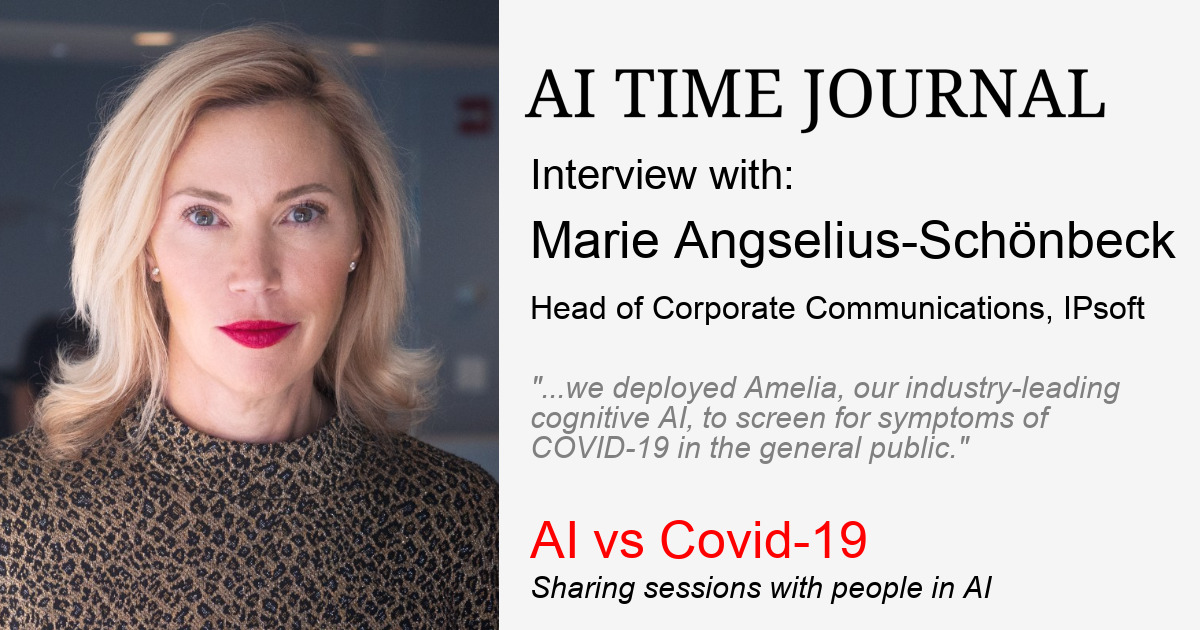
The three things that will get out of these tough times are compassion for people facing the unthinkable; the ability to change; and the drive to innovate.
Marie Angselius-Schönbeck
We thank Marie Angselius-Schönbeck from IPsoft for taking part in our AI vs Covid-19 sharing sessions, which aim to share initiatives, challenges, and successful examples to employ Artificial Intelligence to tackle Covid-19.
How has the pandemic affected your community?
Our global headquarters sits right at the tip of New York City, which was the first hotbed of coronavirus cases in the United States. We also have offices all over the world, including in India, where all 1.3 billion people have been ordered to stay home. That said, we quickly moved into a global posture of remote work out of concern for the health of our staff and their families and in accordance with local stay-at-home orders.
As a tech company, we’re very familiar with decentralized work environments, so we haven’t struggled with managing a 100% remote workforce. Rather, our focus has been on how to ensure the safety of our people and making sure that they feel engaged and supported during the pandemic.
What challenges are your company and your customers currently facing, and how are you working to overcome them?
Every company on earth has been challenged by this pandemic. It has spread so quickly that it’s pushed our customers to reorder their supply chains; transplant their workflows; even reconsider how they can keep the lights. What we’re seeing is that the organizations that are nimble and innovative enough to face those challenges directly have found solutions in automation.
For better or worse, this pandemic has accelerated the adoption of automation across sectors and processes by forcing even risk averse sectors like healthcare to invest in solutions that can close supply chain barriers or fill gaps in labor. Just look at what’s happened to call centers: so many people are calling into hospitals, doctors’ offices and medical call centers to inquire about symptoms that most people don’t stay on the line long enough to have their questions answered. The wait times are just too long. Unfortunately, the bulk of calls will be negative, but at the end of the day, people have simple questions and the call centers can’t scale quickly enough to answer all of them. Companies with automated call centers have had better outcomes, and have been able to serve customers better.
The same can be said of offshoring. Stay-at-home orders in the Philippines and India have cut businesses off from this vital customer service function.Technology has the ability to replicate human interaction well enough that it can take up the load and even fulfill the routine tasks that still need to get done, even when everything around a business is shifting.
We will shift to jobs that are carried out on demand – through cloud computing– from any location, through digital platforms. For example, Digital Employees are now able to alleviate pressure on call center workers by intelligently answering customer queries 24/7.
Automation was already on course to add $800 billion to the US GDP over the next five years. Based on what we’ve seen, we’d estimate that it will be considerably higher in light of this challenge.
Has your company deployed, internally or for your customers, Covid-19-specific AI-powered solutions?
I think it’s fair to say that public life at the moment moves between concern, fear and confusion. People all over the country–and the world–are terrified that they might be infected with the coronavirus and not even know it. So realizing that we had the opportunity to alleviate some of that concern and “flatten the curve,” we deployed Amelia, our industry-leading cognitive AI, to screen for symptoms of COVID-19 in the general public.
Amelia allows users to check their symptoms without having to leave home. It also helps to reduce the burden that inquiries have been placing on healthcare facilities and medical providers, who had to face patients rushing into the ER or inundating their phone systems.
Are people in your company working remotely?
Our entire workforce is working remotely, but as a tech company, decentralized work is second-nature to us. While our global corporate headquarters sits in New York, many of our development teams sit in India and we have support teams all around the world. Constant communication is how we keep the engine running and our employees engaged and connected.
Has any particular use of AI and data science against Covid-19-related problems caught your eye?
There have been countless efforts to use AI and data science to mitigate the impacts of Covid-19. Covid-19 has created a massive demand for technology in order to make sure that patient phone calls are answered or the pandemic is accurately tracked.
It’s impossible to weigh the applications. Everything from e-commerce to tele-health has been pushed to the brink by demands created by Covid-19, and AI-powered solutions have helped to tackle those problems almost instantly.
How do you stay positive in these challenging times?
By knowing that our technology will help create a better world. As people and organizations reconsider their business models in this period, they will invest in new technologies that help humans be more productive and effective.
What have you learned from this situation so far?
That we all – together – rise to the challenge. I am humbled by the true compassion we all show each other.
